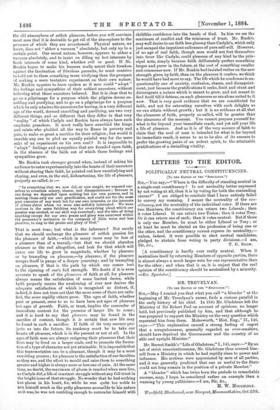MR. TREVELYAN.
[To THE EDITOR OF THE " SPECTATOR."]
Sta,—May I remind you that what you call "a blunder" at the beginning of Mr. Trevelyan's career, finds a curious parallel in the early history of his chief. In 1845 Mr. Gladstone left the Ministry of Sir Robert Peel on account of opinions, no longer held, but previously published by him, and that although he was prepared to support the Ministry on the very question which separated him from them. Molesworth, " Hist. Eng.," II., 146, says :—" This explanation caused a strong feeling of regret that a scrupulousness, generally regarded as over-sensitive, should have deprived the Government and the country of an able and upright Minister."
Mr. Barnet Smith's "Life of Gladstone," I., 145, says:—" By an act of strict conscientiousness, Mr. Gladstone thus severed him- self from a Ministry in which he had rapidly risen to power and influence. His motives were appreciated by men of all parties, and it was generally predicted. that one so useful to the State could not long remain in the position of a private Member."
A " blunder" which has twice been the prelude to remarkable success, may, I hope, be considered rather an example than a warning by young politicians:—I am, Sir, &c.,
M. W. MOGGRIDGE.
TY °afield, Blackwood, near Newport, Monmouthshire, Oct. 27th.














































 Previous page
Previous page